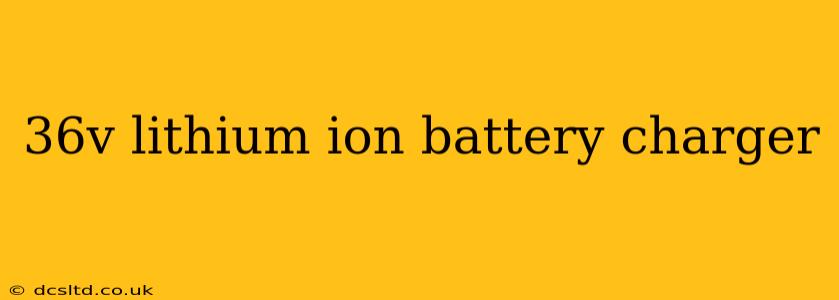Finding the right charger for your 36V lithium-ion battery is crucial for its longevity and performance. This guide delves into the specifics of 36V lithium-ion battery chargers, addressing common questions and concerns to help you make an informed decision.
What are the Different Types of 36V Lithium Ion Battery Chargers?
36V lithium-ion battery chargers come in various types, each with its own set of advantages and disadvantages. The most common types include:
-
Standard Chargers: These are generally the most affordable option and suitable for most applications. They typically offer a consistent charging rate.
-
Fast Chargers: These chargers deliver a higher charging current, significantly reducing the charging time. However, they may generate more heat and potentially impact battery lifespan if not designed properly.
-
Smart Chargers: These chargers incorporate advanced features like temperature monitoring and automatic charging cessation once the battery is fully charged. This protects the battery from overcharging and extends its lifespan.
-
Constant Current/Constant Voltage (CC/CV) Chargers: This is the most common charging method for lithium-ion batteries. The charger initially delivers a constant current until the battery reaches a certain voltage, then switches to a constant voltage to complete the charging process.
How Do I Choose the Right 36V Lithium-Ion Battery Charger?
Selecting the appropriate charger depends on several factors:
-
Battery Chemistry: Ensure the charger is compatible with the specific chemistry of your 36V lithium-ion battery (e.g., LiFePO4, LiMn2O4, NMC). Using an incompatible charger can severely damage the battery.
-
Charging Current (Amperage): The charging current is expressed in Amperes (A). Higher amperage means faster charging, but it's vital to choose a charger with a current rating that your battery can safely handle. Check your battery's specifications for the recommended charging current.
-
Charging Time: Consider how quickly you need to charge your battery. Fast chargers offer significant time savings, but again, ensure they are compatible with your battery's capabilities.
-
Safety Features: Look for chargers with safety features like overcharge protection, short-circuit protection, and temperature monitoring. These features protect your battery and prevent potential hazards.
What are the Safety Precautions When Using a 36V Lithium Ion Battery Charger?
Safety should always be the top priority when dealing with lithium-ion batteries and chargers. Here are some essential precautions:
- Never leave a battery unattended while charging.
- Always use the charger specifically designed for your battery. Using the wrong charger can lead to battery damage, fire, or explosion.
- Charge the battery in a well-ventilated area. Lithium-ion batteries generate heat during charging.
- Avoid charging the battery in extreme temperatures. Charging in extremely hot or cold environments can negatively impact battery performance and lifespan.
- Inspect the charger and battery for any damage before use. Do not use a damaged charger or battery.
How Long Does it Take to Charge a 36V Lithium Ion Battery?
The charging time depends on the battery's capacity (measured in Ampere-hours, Ah) and the charger's output current. A larger battery capacity will naturally take longer to charge. A higher charging current (amperage) will reduce the charging time, but as mentioned earlier, you must ensure your battery is compatible with the higher current.
What are the Signs of a Faulty 36V Lithium Ion Battery Charger?
Several signs might indicate a faulty charger:
- The charger doesn't turn on.
- The battery doesn't charge.
- The charger gets excessively hot.
- The charger emits unusual noises or smells.
- The charger's indicator light behaves erratically.
If you notice any of these signs, immediately discontinue using the charger and contact the manufacturer or a qualified technician.
Can I Use a Different Voltage Charger for my 36V Lithium Ion Battery?
No. Using a charger with a different voltage is extremely dangerous and can severely damage the battery, potentially leading to fire or explosion. Always use a charger with the exact voltage rating specified for your battery. A 36V battery requires a 36V charger. No exceptions.
This guide offers a comprehensive overview of 36V lithium-ion battery chargers. Always consult your battery's specifications and the charger's manual before use to ensure safe and proper operation. Remember, prioritizing safety is crucial when handling lithium-ion batteries and chargers.
